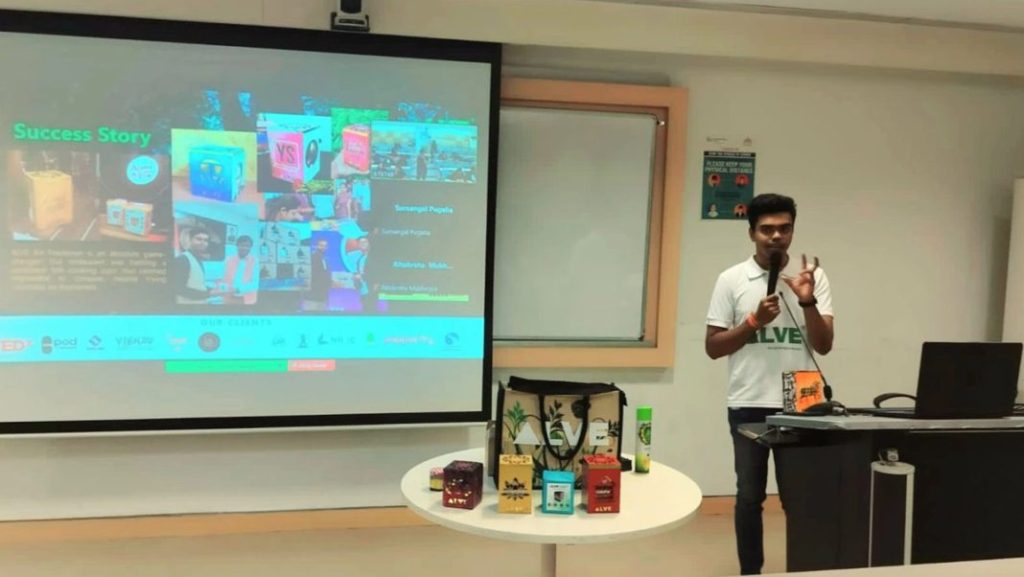(April 27, 2024) It was in 2022 that Rajiv Sharma, a Jamshedpur resident, found himself in a hospital after a few serious bouts of vomiting, nausea, and headaches. Upon investigation, he found the reason behind his sudden illness – the recently introduced air fresheners at his home. Not many know but air fresheners have adverse health effects including migraine headaches, asthma attacks, breathing difficulties, earache, and mucosal symptoms. The news left him shocked but equally motivated him to come up with a solution that was eco-friendly and had no side effects on his health. That’s when he began crafting air fresheners using temple flower waste and wood.

Rajiv Sharma
“There are many poisonous chemicals in air fresheners. All you need to do is read the ingredient list behind any air freshener. It’s not safe for children (mentioned in the packaging) and animals to inhale. I wanted to make a freshener which was safe for the environment as well as humans and animals,” he said in an interview. With the help of his college professors at the National Institute of Design, Andhra Pradesh, he perfected the product, and 20 prototypes later, he founded ALVE air fresheners. So far, has recycled 1,500 kg of temple flower waste.
Rajiv calls the use of natural ingredients, its sustainable design allowing for composting after use, and integration of smart technology as the USP of the product. In just a few months, they have sold over 850 air fresheners.
How it’s done
Explaining the process, he initially began with crafting natural fragrances from flower waste which he collected from a nearby temple. He gathered jasmine and roses, air-dried the petals, crushed them into powder with a mixer, and later blended them with coconut husk waste. He kept the mixture for air drying for a few days for the fragrance to be prepared. Rajiv then housed this essence in a glass bottle and fashioned an outer casing from wood, culminating in his homemade, environmentally-conscious fragrance.


It was his mom who was his soundboard when he was using all permutations and combinations to create the air freshener initially. But when his professors learnt about his innovation, they were more than happy to lend their support and guidance. “They said that this needs to be given to a bigger audience and is the need of the hour. They helped me perfect it with the help of machines in the college,” he added.
Available in 15 distinct fragrances that are tailored for homes, offices, and cars, they also come with smart technology. Armed with smart sensors, the air fresheners autonomously activate and deactivate upon detecting an individual’s presence. Moreover, it seamlessly integrates with Google Assistant for added convenience.
Reducing floral waste
In this short span, Rajiv has partnered with 30 temples in Jamshedpur for floral waste and collects over 3 kg of floral waste each day from every temple. “We use nature’s intelligence in retaining the fragrances. Chemical fresheners use LPG to retain the fragrance. We use natural ingredients for that with no chemicals. We do not use any heat, water vapour or chemicals to diffuse our fragrances. We use our own Air Diffusion Technology with sensors to diffuse aroma evenly in the surroundings,” he added.
View this post on Instagram
Rajiv has plans to expand ALVE and make it a part of every household. “I want to create products that not only meet human needs but also leave a positive imprint on our planet. Our vision at ALVE is to inspire a world where fresh, clean air is not a luxury but a sustainable standard,” he added.
A champion of sustainability
Rajiv’s innovative approach to air fresheners not only enhances the olfactory experience but also champions environmental sustainability. By repurposing temple waste into fragrant solutions, he not only provides an effective product but also contributes to waste reduction efforts. With each unit sold, Sharma’s impact extends beyond mere freshness, reaching into the realms of eco-consciousness and community engagement.
His dedication to merging technology with eco-friendly practices not only benefits individuals by improving air quality but also serves as a model for how small-scale innovations can make significant contributions to both public health and environmental conservation. Rajiv Sharma’s endeavor exemplifies the transformative power of innovation in fostering a healthier, more sustainable future for all.
- Follow ALVE Green Solution on Instagram




